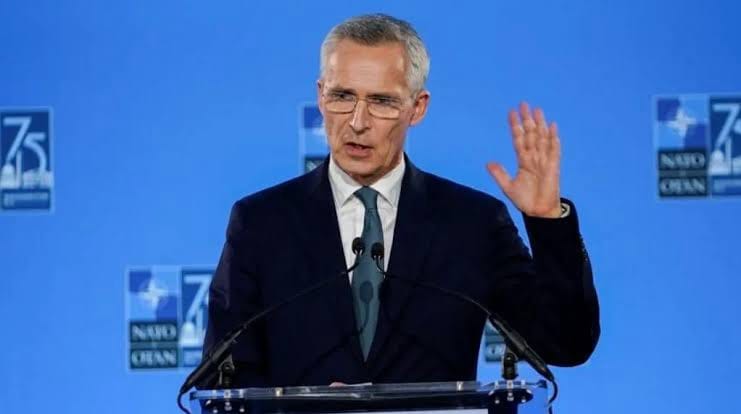Nato vows ‘irreversible path’ to Ukraine membership

A Nato members have pledged their support for an “irreversible path” to future membership for Ukraine, as well as more aid.
While a formal timeline for it to join the military alliance was not agreed at a summit in Washington DC, the military alliance’s 32 members said they had “unwavering” support for Ukraine’s war effort.
Nato has also announced further integration with Ukraine’s military and members have committed €40bn ($43.3bn, £33.7bn) in aid in the next year, including F-16 fighter jets and air defense support.
The bloc’s Secretary-General Jens Stoltenberg said: “Support to Ukraine is not charity — it is in our own security interest.”
UK Prime Minister Sir Keir Starmer and US President Joe Biden were among Nato leaders who reaffirmed their support for Ukraine at the summit
The ongoing invasion of Ukraine was top of the agenda at Nato’s summit, and a declaration agreed by all members said Russia “remains the most significant and direct threat” to security.
US Secretary of State Antony Blinken confirmed US-built F-16 jets are in the process of being transferred to Ukraine from Denmark and the Netherlands.
It will be the first time Ukraine has received the advanced aircraft, something which Kyiv has long called for. Blinken told the summit the jets will be in use “this summer”.
Nato members agreed to set up a new unit to coordinate military aid and training for the Ukrainian army as part of measures designed to deepen ties between the alliance and Ukraine.
The joint statement said these measures, combined with aid commitments from individual members, “constitute a bridge to Ukraine’s membership in Nato”.
It said Ukraine had made “concrete progress” on “required democratic, economic, and security reforms” in recent months — but that a formal membership invitation would only be extended when “conditions are met”.
“As Ukraine continues this vital work, we will continue to support it on its irreversible path to full Euro-Atlantic integration, including Nato membership,” the statement added.
It also accused China of being a “decisive enabler” for Russia’s war against Ukraine, in some of its harshest remarks yet on Beijing’s involvement.
This prompted an angry response from Beijing’s mission to the EU, which called on Nato to “stop hyping up the so-called China threat, and provoking confrontation and rivalry”.
Ukrainian President Volodymyr Zelensky was invited to the Nato summit and had meetings with world leaders, including his first with Sir Keir Starmer since he became prime minister of the United Kingdom.
Sir Keir told Zelensky there would be “no change in support” for Ukraine’s war effort despite there being a new government in London.
Zelensky also met US politicians from both the Democrat and Republican parties, a move designed to shore up cross-party support for Ukraine after a stand-off in Congress earlier this year saw a large military aid package delayed for several months.
Nato leaders had hoped this week’s summit would provide an opportunity to present a united front on Ukraine after modest Russian gains on the battlefield in recent months.
However, there may be some disappointment in Kyiv that there was no clear public indication on how long it would be until Ukraine is offered full membership.
The summit — which marked the 75-year anniversary of the alliance’s foundation — came months ahead of an election which could see Donald Trump, a Nato critic, return to the White House, and amid political troubles for US President Joe Biden.
As Biden, 81, met other Nato leaders on Wednesday, some influential Democrats publicly called for him to quit the race over fears he is too old to perform against Trump, 78, in what is likely to be a closely fought campaign.
Responding to a question from the BBC, Stoltenberg refused to be drawn on whether the US’s domestic politics could impact the alliance.
He said: “Nato is the most successful alliance in history because we have been able to stay out of domestic political debates.
“It’s important for me to continue to do what I can to ensure that that continues to be the case.”
Biden used the summit to reaffirm his support for Ukraine and call for more defense investment from other members which have lagged behind on spending.
He said Russia is on a “wartime footing” in terms of defense production with support from Russia, North Korea and Iran — and leaders “cannot allow the alliance to fall behind”.
“We can and will defend every inch of Nato territory”, the president added.












